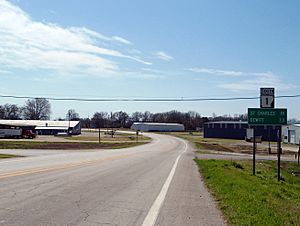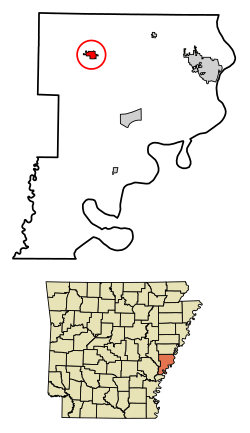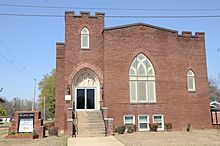Marvell, Arkansas facts for kids
Quick facts for kids
Marvell, Arkansas
|
|
|---|---|

Arkansas Highway 1 in Marvell
|
|

Location of Marvell in Phillips County, Arkansas.
|
|
| Country | United States |
| State | Arkansas |
| County | Phillips |
| Area | |
| • Total | 1.44 sq mi (3.72 km2) |
| • Land | 1.44 sq mi (3.72 km2) |
| • Water | 0.00 sq mi (0.00 km2) |
| Elevation | 210 ft (60 m) |
| Population
(2020)
|
|
| • Total | 855 |
| • Density | 595.40/sq mi (229.83/km2) |
| Time zone | UTC-6 (Central (CST)) |
| • Summer (DST) | UTC-5 (CDT) |
| ZIP code |
72366
|
| Area code(s) | 870 |
| FIPS code | 05-44420 |
| GNIS feature ID | 2405033 |
Marvell is a city located in Phillips County, Arkansas, in the United States. In 2020, about 855 people lived there.
Contents
History of Marvell
Marvell was started when Marvell M. Carruth and his wife, Rachel, sold some land to the Arkansas Central Railroad. A train station was built there. Marvell became an official town on May 28, 1873. R.M. Jackson was its first mayor. Three years later, on October 3, 1876, Marvell became an "incorporated" town. This means it got its own local government.
In 1877, the Arkansas Central Railroad had financial problems. Its property was sold at a public auction. A new company, the Arkansas Midland Railway, took over on December 6, 1877. This new railroad became very successful. It carried goods and also offered daily passenger service. People could travel from Clarendon to Brinkley and then to Helena, with stops in Marvell. This train service ran until 1952. The train tracks that went from Marvell to Holly Grove were no longer used after 1977.
In the early 1900s, Marvell had many different stores, about 15 of them. One of the oldest stores was A. Hirsch & Co. It was a big business and owned valuable land. The Garner Stave Company sold various items, including farming tools.
The Marvell Public Library opened in 1922. It was started by Mrs. Dave McDonald, who worked there until she passed away. In 1925, the Marvell Bottling plant was built by James Williford. However, it closed soon after because sugar was too expensive and hard to find.
During the start of the Great Depression, most banks in Phillips County closed. But the Bank of Marvell stayed open. In 1930, County Judge E.P. Molitor, who was from Marvell, began building a road. This road connected Helena to Clarendon.
In the 1980s, Mayor Alma Norton helped build the Marvell City Park and a bike trail. These were built on the old railroad tracks. Davidson Park was also built and given to the city by the Abe Davidson family.
In the 1990s, Marvell had about 1,545 people. In 1997, the Marvell Medical Clinic was built. This happened with help from UAMS East and a grant from the government. Citizens also donated money. The clinic grew quickly. In just one year, it added dental services. It also started using video calls for medical advice and health education.
Marvell was even shown on ABC News in 2009. The news report talked about a type of plant called pigweed that was resistant to pesticides. This plant was causing problems for farms in the area.
Geography of Marvell
Marvell covers a total area of about 1.4 square miles (3.7 square kilometers). All of this area is land.
People in Marvell
| Historical population | |||
|---|---|---|---|
| Census | Pop. | %± | |
| 1880 | 177 | — | |
| 1900 | 391 | — | |
| 1910 | 556 | 42.2% | |
| 1920 | 781 | 40.5% | |
| 1930 | 624 | −20.1% | |
| 1940 | 830 | 33.0% | |
| 1950 | 1,121 | 35.1% | |
| 1960 | 1,690 | 50.8% | |
| 1970 | 1,980 | 17.2% | |
| 1980 | 1,724 | −12.9% | |
| 1990 | 1,545 | −10.4% | |
| 2000 | 1,395 | −9.7% | |
| 2010 | 1,186 | −15.0% | |
| 2020 | 855 | −27.9% | |
| U.S. Decennial Census | |||
2020 Census Information
The table below shows the different groups of people living in Marvell, Arkansas, based on the 2000, 2010, and 2020 censuses.
| Race / Ethnicity (NH = Non-Hispanic) | Pop 2000 | Pop 2010 | Pop 2020 | % 2000 | % 2010 | % 2020 |
|---|---|---|---|---|---|---|
| White alone (NH) | 561 | 416 | 288 | 40.22% | 35.08% | 33.68% |
| Black or African American alone (NH) | 802 | 736 | 534 | 57.49% | 62.06% | 62.46% |
| Native American or Alaska Native alone (NH) | 5 | 3 | 0 | 0.36% | 0.25% | 0.00% |
| Asian alone (NH) | 0 | 2 | 1 | 0.00% | 0.17% | 0.12% |
| Pacific Islander alone (NH) | 0 | 0 | 0 | 0.00% | 0.00% | 0.00% |
| Some Other Race alone (NH) | 0 | 0 | 0 | 0.00% | 0.00% | 0.00% |
| Mixed Race or Multi-Racial (NH) | 16 | 16 | 23 | 1.15% | 1.35% | 2.69% |
| Hispanic or Latino (any race) | 11 | 13 | 9 | 0.79% | 1.10% | 1.05% |
| Total | 1,395 | 1,186 | 855 | 100.00% | 100.00% | 100.00% |
In 2000, there were 1,395 people living in Marvell. The population density was about 1,024 people per square mile (395 people per square kilometer). The city had 594 housing units.
Education in Marvell
The Marvell–Elaine School District serves the community. The schools in this district include Marvell Primary School and Marvell High School.
Marvell Academy is a private school for students from K3 (preschool) to 12th grade. It is located near Marvell in an unincorporated part of Phillips County. Marvell Academy was founded in 1966.
Notable People from Marvell
- Sam Carr, a blues musician.
- Clark Hall, who served as mayor, state representative, and Phillips county judge.
See also
 In Spanish: Marvell (Arkansas) para niños
In Spanish: Marvell (Arkansas) para niños
 | Tommie Smith |
 | Simone Manuel |
 | Shani Davis |
 | Simone Biles |
 | Alice Coachman |



